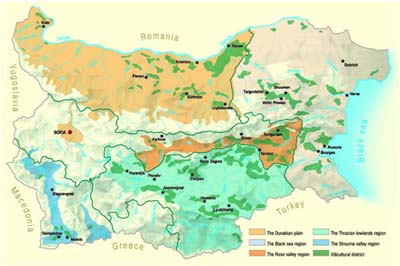| In honour of the state
visit of the Bulgarian Prime Minister Sergei Stanishev last
week we bring a special feature on their wines. Bulgarian
wines are a jigsaw of modern attitude and antique history
says Dr. Elissaveta Velianova, our guest
writer from Bulgaria .
Bulgaria has had an antique history
of wine:
 Bulgarian
wines are known to many wine aficionados. But behind the
contemporary image remains hidden centuries-old winemaking
tradition. The winemaking history of the country dates back
to ancient time - the Thracian tribes, which populated the
territory of contemporary Bulgaria, grew grapes some four
thousand years ago. Indeed, Homer praised the wines of the
ancient Thrace in the Iliad and the Odyssey. During the
ancient times Bulgaria was a melting pot for Thracians,
Slavonic and Protobulgarian tribes, Greeks and Romans. The
latter two also contributed to the advances in viti- and
viniculture by introducing new techniques and expanding
the area under vine. Wine was further integrated into the
daily life of medieval Bulgaria. Bulgarian
wines are known to many wine aficionados. But behind the
contemporary image remains hidden centuries-old winemaking
tradition. The winemaking history of the country dates back
to ancient time - the Thracian tribes, which populated the
territory of contemporary Bulgaria, grew grapes some four
thousand years ago. Indeed, Homer praised the wines of the
ancient Thrace in the Iliad and the Odyssey. During the
ancient times Bulgaria was a melting pot for Thracians,
Slavonic and Protobulgarian tribes, Greeks and Romans. The
latter two also contributed to the advances in viti- and
viniculture by introducing new techniques and expanding
the area under vine. Wine was further integrated into the
daily life of medieval Bulgaria.
The first mention of a grape variety was
in a legend that has survived to present days. The 'Mavrud'
legend probably dates back to the time of the Bulgarian
ruler, Khan Krum in the nineth century. Mavrud
is an indigenous variety which was named after a youth who
was brave enough to ignore the Khan's recently introduced
wine prohibition order. Mavrud drank wine, made from a secretly
kept vine. It gave him the strength and courage to capture
a lion that roamed free after escaping from the Khan's palace.
His bravery convinced the ruler that wine should be cherished
and the grateful citizens named the variety Mavrud.
Winemaking not only survived the 5- century
Ottoman rule (end of IV-XIX century) but notes of merchants,
travellers and, later on, Western journalists and diplomats
mentioned wines of different regions and incorporated comments
on their qualities.
Phylloxera hit Bulgaria too:
The Phylloxera that struck Europe in the
nineteenth century did not spare Bulgaria's vineyards either.
However, this disaster acted as an incentive for the growers
who introduced new varieties, disease-resistant stocks.
At the time, growers started to co-operate to improve their
access to finance and technology.
Page
1 2 3
|